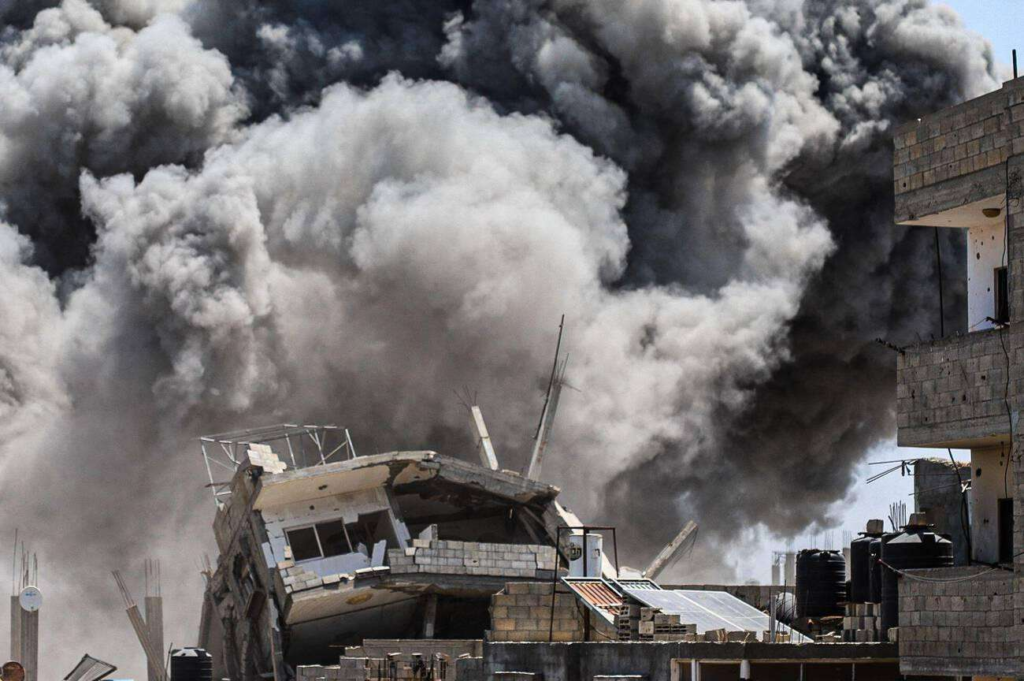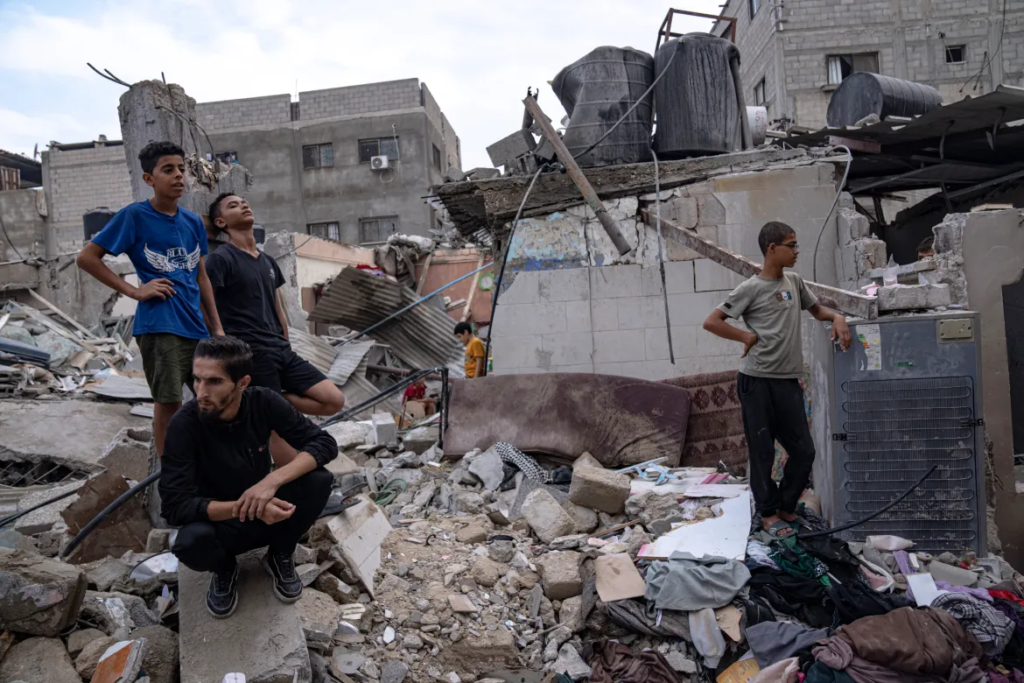Gaza experienced another day of devastation as airstrikes and gunfire killed at least 59 people, with dozens more injured. The ongoing conflict has left neighborhoods in ruins, hospitals overwhelmed, and families searching desperately for missing loved ones. Among the casualties were children, elderly residents, and families who had hoped to find safety in their homes.
The violence has once again drawn international attention, with governments and organizations calling for an immediate ceasefire. In Washington, policymakers face mounting pressure to clarify the United States’ stance on the escalating humanitarian crisis, as American foreign policy has long played a pivotal role in shaping outcomes in the region.
The Human Toll
Survivors describe scenes of unimaginable horror. Buildings that once housed families now lie in rubble, their walls shattered by bombs. Streets are filled with smoke and debris, punctuated by the cries of those searching for loved ones. Hospitals, already strained by previous waves of conflict, are struggling to treat the injured. Doctors and nurses work around the clock, treating burns, gunshot wounds, and trauma, while rationing supplies and equipment.
Families mourn the loss of parents, children, and siblings. Each statistic in the death toll represents a human story—a life interrupted, dreams left unrealized, and futures forever altered. Survivors speak of fear so intense it lingers even when the immediate threat passes, a constant reminder of the fragility of life in conflict zones.

Escalation and Its Roots
The current wave of violence stems from long-standing political and territorial disputes, compounded by recent incidents that ignited retaliation from multiple sides. Airstrikes have targeted alleged militant positions, while gunfire has hit civilian areas, leaving no one untouched.
International observers note that the conflict is not isolated; it is deeply entwined with U.S. foreign policy decisions, including military aid, diplomatic support, and engagement with regional partners. American influence shapes the strategies and responses of both sides, making Washington’s role critical in determining whether the escalation continues or is curtailed.
Calls for a Ceasefire
As the death toll rises, global leaders have renewed their appeals for a ceasefire. Humanitarian organizations are pleading for safe corridors for civilians, immediate medical aid, and protection for vulnerable populations. The United Nations has emphasized the urgent need to prevent further civilian casualties and to address the humanitarian crisis that grows with each passing day.
Diplomatic channels are working to bring parties to the table, but mistrust and entrenched positions make progress difficult. Analysts warn that without decisive action, the cycle of violence may continue indefinitely, with devastating consequences for both the people of Gaza and regional stability.
The Role of the United States
The United States, as a major international actor, faces scrutiny over its policies in the Middle East. Military aid, arms sales, and diplomatic support all influence the trajectory of the conflict. While U.S. officials have expressed concern over civilian casualties, critics argue that stronger diplomatic intervention is needed to prevent further bloodshed.
Congressional debates have intensified, with some lawmakers advocating for conditioned aid and stronger calls for ceasefires, while others emphasize strategic partnerships and long-term security interests. The tension highlights the complex balancing act of promoting stability abroad while addressing humanitarian concerns.
Personal Stories Amid the Crisis
Amid the chaos, individual stories highlight the human impact of the conflict. One family lost their home in an airstrike, barely escaping with only the clothes on their backs. A young boy, separated from his parents during a firefight, was reunited hours later at a makeshift shelter, traumatized but alive. Doctors recount nights spent performing surgeries without adequate supplies, racing against time to save lives that hang in the balance.
These narratives put faces to the statistics, showing the profound suffering behind the headlines. They also reveal the courage and resilience of civilians determined to survive and care for one another despite overwhelming adversity.
The Strain on Infrastructure
Gaza’s infrastructure is under immense strain. Hospitals are overcrowded, water and electricity supplies are inconsistent, and roads have been damaged by shelling. Schools and community centers have been converted into emergency shelters, but space and resources remain limited.
Humanitarian workers emphasize that immediate relief is essential to prevent further suffering. Medical supplies, clean water, food, and temporary shelter are all urgently needed. The international community is called upon to support relief efforts while working toward a sustainable resolution to the conflict.
International Reactions
World leaders have expressed alarm over the rising death toll. Countries across Europe, Asia, and the Middle East have issued statements urging restraint and negotiation. Human rights organizations are documenting incidents and calling for accountability for actions that put civilians at risk.
These reactions underscore the global significance of the conflict. Gaza is not only a local crisis but a point of international concern, with implications for diplomacy, security, and humanitarian norms.
The Psychological Impact
Beyond the immediate physical destruction, the psychological toll is immense. Survivors report anxiety, nightmares, and depression. Children, in particular, face long-term developmental and emotional challenges after witnessing violence. Mental health services are limited, and the scale of trauma often exceeds the available resources.
Psychologists emphasize that addressing mental health is as critical as providing food, shelter, and medical care. Long-term recovery depends on both rebuilding infrastructure and supporting emotional resilience.
Voices from the Ground
Local leaders and community members have spoken about the need for international solidarity. Volunteers risk their lives to rescue neighbors from rubble, distribute aid, and provide emotional support. Religious and civic leaders call for compassion and reconciliation, emphasizing that peace is the only path to protecting future generations.
These voices reflect the determination of ordinary people to maintain humanity and dignity, even amid violence. Their efforts remind the world that hope can persist even in the darkest moments.
The Path Forward
Ending the violence will require coordinated international diplomacy, active engagement from regional powers, and a willingness to prioritize human life over strategic interests. Calls for a ceasefire must be matched by tangible measures on the ground—safe zones, humanitarian corridors, and transparent negotiations.
U.S. policymakers, as influential actors in the region, face critical choices. Decisions made in Washington can either help de-escalate the conflict or risk prolonging suffering. The stakes are not only political but profoundly human.
Lessons and Reflections
The events in Gaza highlight the consequences of unresolved political tensions, the fragility of civilian safety in conflict zones, and the need for sustained international attention. They also illustrate the power of individual courage, the resilience of communities, and the importance of global cooperation.
For the global audience, the crisis is a reminder that empathy, advocacy, and action are vital. While headlines capture the immediate violence, lasting solutions require persistent attention, humanitarian support, and political commitment.

Holding On to Hope
Even in the midst of tragedy, stories of survival, solidarity, and compassion emerge. Neighbors helping neighbors, volunteers risking safety to deliver aid, and families finding each other after hours of fear all demonstrate the enduring human spirit.
These examples of hope serve as a counterpoint to the destruction, suggesting that while conflict can devastate infrastructure and lives, it cannot entirely extinguish humanity.
A Call for Global Responsibility
The situation in Gaza is a test of international will. Governments, organizations, and citizens alike are called to respond with urgency, compassion, and integrity. Humanitarian aid must be prioritized, diplomatic efforts intensified, and policies carefully assessed to prevent further escalation.
Ultimately, the crisis underscores the interconnectedness of the world. Decisions made in capitals thousands of miles away have real, immediate consequences for families in Gaza. Recognizing that responsibility is the first step toward a safer, more just future.
Moving Forward
The path ahead will be challenging. Rebuilding homes, restoring infrastructure, and addressing trauma will take years. But even amid devastation, communities in Gaza show resilience and determination. With global support, focused diplomacy, and humanitarian assistance, it is possible to chart a course toward recovery, peace, and stability.
The violence may have claimed lives, destroyed property, and shaken communities, but it cannot destroy hope. It cannot erase the courage of those who help one another, the determination of those who survive, or the universal aspiration for peace.
Do Follow USA Glory On Instagram
Read Next – Changing Viewership Trends: Americans Adapt to Media and Politics






